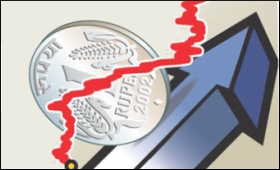|
|
|

|
Rising food, crude prices coupled with weak rupee fuel inflation
|
|

|
|
| Top Stories |
 |
|
|
|
IANS | 08 Oct, 2022
Inflation in India has been on the rise consistently for the past
several months and various reasons can be attributed to it such as
soaring food and oil prices, among others.
However, most importantly, the sharply depreciating rupee against the dollar is one of the most significant reasons behind it.
India's
retail inflation rose to 7 per cent in August from 6.71 per cent in
July and this was due to higher food prices. In fact, retail inflation
has been beyond the Reserve Bank of India's (RBI) tolerance limit of 6
per cent for eight months in a row.
A rise in food prices has led
to a spike in retail inflation and this is evident from the fact that
inflation in food basket was 7.62 per cent in August, up from 6.69 per
cent in July and more than double from 3.11 per cent in August 2021.
Earlier
this year, crude oil price had touched $130 a barrel. However, in
September, it slid to less than $85 per barrel. But now they may rise
again as OPEC+, the group of oil-producing nations, has decided to cut
down oil production.
Rising oil prices directly impact inflation
in India. This can be gauged from the fact that India imports more than
85 per cent of its oil requirement.
As crude oil prices start to rise, imports will also go up, which in turn will widen the current account deficit (CAD).
Widening
CAD will further weaken the rupee, as in the face of widening deficit,
the country will be forced to sell rupee and buy dollars.
A weak rupee has fuelled inflation in India.
The
RBI on September 30 had decided to hike the repo rate by 50 basis
points to 5.4 per cent and focus on withdrawal of accommodation to keep
inflation within tolerance limits.
In order to control inflation, the RBI has been hiking repo rates since May this year.
Last week, the central bank had also retained its retail inflation forecast for the current financial year at 6.7 per cent.
The
Monetary Policy Committee (MPC) of the RBI had observed on September 30
that inflation is projected to remain above the upper tolerance level
of 6 per cent through the first three quarters of 2022-23.
Considering
the rising level of inflation, the MPC had decided that further
calibrated monetary policy action is needed to keep retail inflation
within tolerance limits.
Due to monetary policy tightening across
the world, and the continuing war between Ukraine and Russia, the
global scenario has worsened as disruptions in supply chains have
fuelled price rise.
Resultantly, these prevailing situations have fuelled the risks of recession globally.
This
has also impacted stock markets, as India has seen large portfolio
outflows worth $13.3 billion during the current financial year.
Volatile global markets have impacted domestic currency and stock markets, thus leading to inflation in India.
|
|
|
| |
|
|
|
|
|
|
|
|
|
|
|
|
|
|
| |
| Customs Exchange Rates |
| Currency |
Import |
Export |
US Dollar
|
₹84.00
|
₹82.25 |
UK Pound
|
₹104.65
|
₹108.10 |
Euro
|
₹92.50
|
₹89.35 |
| Japanese
Yen |
₹56.10 |
₹54.40 |
| As on 25 Jul, 2025 |
|
|
| Daily Poll |
 |
 |
| Who do you think will benefit more from the India - UK FTA in the long run?
|
|
|
|
|
|
| Commented Stories |
 |
|
|
|
|
|
| |
|